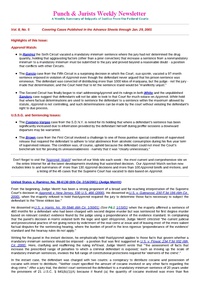This decision will surprise a lot of Apprendi watchers. Here, the defendant, Gilbert Garcia, argued on his direct appeal that his five year term of supervised release was erroneous under Apprendi - but he never challenged his prison sentence of 97 months. On appeal, the Fifth Circuit not only …
This case provides one of the most detailed analyses we have seen recently of the general considerations that apply to the imposition of special conditions of supervised release, under U.S.S.G. § 5D1.3. The defendant in this case pled guilty to two counts of distributing cocaine and cocaine base, and …
Here the Court held that there was no violation of Due Process Clause and no violation of Apprendi even though the amount of the tax loss on which the Guideline range was based was not charged in the indictment nor found by the jury.
The defendant in this …
Here, the court denied the petitioner's motion to review his sentence under 28 USC § 2255 based on Apprendi, holding that such a review was barred by the retroactivity rules of Teague v. Lane and that Apprendi did not announce a watershed rule.
In this decision, Judge Wiseman …
In this case, Judge Batts touched briefly on one Apprendi issue, but the more significant aspects of her decision dealt with the possibility of a downward departure in cases where the defendant’s sentence has been increased significantly due to information provided by the defendant himself during proffer sessions.
The …
Although much of this decision dealt with Apprendi issues, the Court did hold that the district court had erred in concluding that it did not have any authority to depart from the mandatory stacking provisions of USSG § 5G1.2.
This case is principally noted for its discussion of …
Here the Court joined with the vast majority of Circuits in holding that, for double jeopardy purposes, a defendant cannot be convicted under both 21 U.S.C. § 841(a) and 21 U.S.C. § 860 [the schoolyard statute] for the same transactions.
This case is principally noted for its discussion …
Here, the 2nd Circuit rejected a series of Apprendi claims, including one holding that where factual determinations are used to sentence the defendant to a sentence within the maximum allowed by statute, Apprendi is not controlling.
To date the Second Circuit has been slow in addressing Apprendi issues; …
From the beginning, Judge Merritt has been a strong proponent of a broad and far-reaching interpretation of the Supreme Court’s decision in Apprendi v. New Jersey, 530 U.S. 466 (2000). He dissented in U.S. v. Gatewood, 230 F.3d 186 (6th Cir. 2000), when the majority refused to hold that …
In this unpublished summary order, the panel denied an Apprendi claim in a case where the defendant had pled guilty, stating that when he knowingly entered into a guilty plea, he waived all non-jurisdictional defects in prior proceedings.
This decision was published as a summary order and thus …
Here the Court held that a defendant must be "substantially less culpable than the average participant" to qualify as a minor participant under USSG § 3B1.2 - rather than to evaluate his role in reference to the criminal enterprise in which he took part.
Here, in affirming the …
